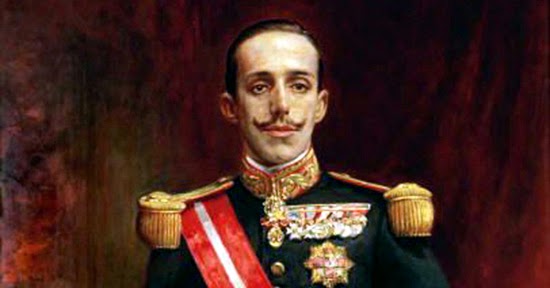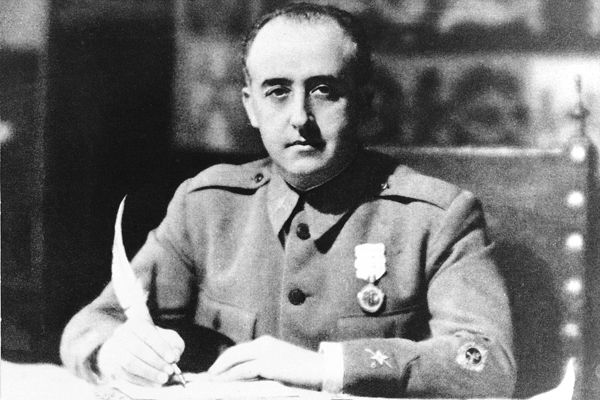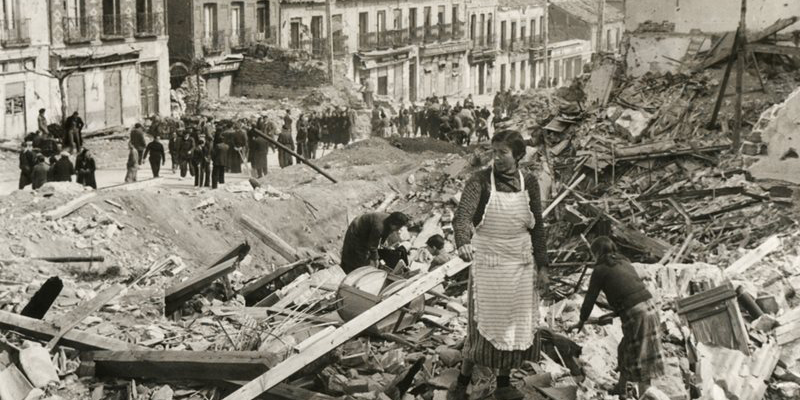The Clash’s 1979 album London Calling is widely considered one of the most important of its era. Joe Strummer’s politically charged diatribes perfectly captured the nervousness of a British youth in the nascency of Margaret Thatcher’s premiership; it is, at its core, a political album. The backdrop for these politics switches regularly throughout the album; from the concrete streets of Brixton to the rolling hills of the Andalusian countryside. It is the latter that will be explored in this post, the era-spanning, sabre-rattling ‘Spanish Bombs.’ Strummer touches on numerous historical events throughout the course of the song, linking the events of the Spanish Civil War with the contemporary Basque separatist movement, and even the actions of the IRA. It is the war, however, that serves as the main lyrical setting for the song. Of course, Strummer’s interpretation of these events is just that, an interpretation. The Clash’s famously left wing politics are on show throughout the song – most jarringly in the implied support for Basque terrorists – and must be remembered when listening to Strummer’s captivating words. This post aims to explain the historical events that inspired his lyrics, and as such, begins with an explanation of how Spain arrived at civil war.

Background
In the first couplet of the song Strummer tells of the days of ’39, but the real story begins some eight years previous, in 1931. Spain entered the decade of its greatest upheaval brimming with social, economic, and political antagonisms. Aggrieved by the torpid pace of improvement in their lives, the Spanish people were ready for change. This change would come in April, when election results convinced King Alfonso XIII that his position was untenable. The Spanish monarchy – once the most powerful institution in the world – was dissolved and replaced with a republican government.

King Alfonso XIII
The hopeful outlook of the Spanish people soon gave way to a familiar feeling of discontent. Despite the efforts of the new government, many of the problems that existed under the ancien regime still persisted, and the elections of 1933 saw a major defeat of the incumbent Socialists and Republicans by a conservative coalition. Spain was plunged into a period of significant violence known as the bienio negro (two black years), when both left and right became increasingly radical. Haunted by their results in ’33, the Socialists and Republicans formed a coalition in the 1936 elections, narrowly defeating the conservatives. However, the loose leftist coalition soon fell apart, the government seemingly powerless to prevent the widely anticipated counterrevolution from the right. The stage was set for war.

Flag of the Spanish Second Republic
In July 1936, a group of Spanish army officers – including Francisco Franco – initiated a coup. Using the soldiers at their disposal, they instigated a series of uprisings across the country against the leftist government. The rebels were a somewhat loose amalgamation of various groups on the right, but soon the Spanish fascist movement (Falange) emerged as its driving force. The rebels’ coup achieved great deals of success throughout much of Spain, but they failed to fully incapacitate the Republicans and a brutal civil war was inaugurated. With military and financial backing from Hitler’s Germany; Franco and the Nationalists eventually defeated the Republicans in 1939. For the next 36 years Franco would rule over Spain as dictator, until his death in 1975. ‘Spanish Bombs’ was written in the midst of Spain’s transition back to democracy, but its lyrics cover the duration of Spain’s turbulent twentieth century journey.

Francisco Franco
Lyrics
‘Spanish songs in Andalusia,
The shooting sites in the days of ‘39’
Andalusia was a hotbed of activity during the war from the moment the coup was launched. As much of the rebels’ strength lay under the command of Franco in Morocco, the region became the mainland landing point for the rebels’ core force. Indeed, Seville – Andalusia’s capital – would soon become the base for the rebels’ activity in Spain. The reference to ‘Spanish songs’ is likely a nod to the nationalist leanings of the rebels, their songs championing Spanish nationalism. This contrasts with the more familiar songs sung by the Republican forces – referenced later in the song – that tended to focus more on the ideals of socialism. ‘The shooting sites’ in question are likely the vast mass graves that have been discovered around Andalusia since Franco’s death. Following the fall of Malaga, thousands of Republicans living in the city were shot and dumped in locations across the region. Many of these graves were discovered in the late ‘70’s, around the time that the lyrics to ‘Spanish Bombs’ were penned.
‘Oh, please leave the ventana open,
Federico Lorca is dead and gone’
Brutal killings were perpetrated by both sides during the conflict, but certainly the Francoists were responsible for the majority. Franco’s forces were deliberately instructed to use extreme force, in an attempt to dissuade potential acts of defiance. This meant that anyone with any link to the Republicans was a potential target. One such victim was the poet and playwright Federico Lorca. Although considered apolitical by some, Lorca’s work often challenged the social status quo of Spanish society – he called for greater rights for women and homosexuals – and as such he was seen as a potential dissident by Francoist forces. Lorca was arrested by rebel soldiers and promptly shot, his remains undiscovered to this day.

Federico Lorca
‘Bullet holes in the cemetery walls,
The black cars of the Guardia Civil’
Once again, Strummer’s lyrics reference the extrajudicial killings committed by Francoist forces. Thousands of civilians were summarily executed during the war, countless undiscovered to this day. Many were slaughtered whilst standing against cemetery walls; records kept in Granada indicate over 2000 people were killed there in this fashion. The Guardia Civil – Spain’s military police – were responsible for a significant portion of these killings. Despite many members eschewing the advances of the Francoist forces, the image of their black cars is strongly associated with these killings.
‘Spanish bombs on the Costa Rica,
I’m flying in on a DC10 tonight’
Here we see the first connection between the days of the war and more contemporary events, Basque terrorism and British tourism in Spain. Throughout the song, Strummer compares the events of the war with the contemporary military campaign of the Basque nationalists (ETA). In the late ‘70’s ETA were in the midst of a bombing campaign that targeted many of the beaches that were frequented by British tourists; many of whom arrived in Spain on a DC10 aeroplane.

Aftermath of an ETA bombing in Madrid, 1973
‘Spanish weeks in my disco casino,
The freedom fighters died upon the hill’
Throughout the song, Strummer extols the virtues of the ‘freedom fighters,’ the leftist groups who rushed to the defence of the crumbling Spanish Republic. Anarchists, Communists, and Republicans formed a broad coalition to repel the advances of the rebels, attracting a great number of volunteers from abroad. Communists in particular flocked to Spain, forming the International Brigades and fighting ferociously against the far superior Francoist forces.
‘They sang the red flag,
They wore the black one,
After they died it was Mockingbird Hill’
Here, Strummer references the coalition of Communists and Anarchists, who fought together on the Republican side. The ‘Red Flag’ was both a physical symbol and popular song of the Communist movement, whilst the Anarchists often used a black flag to represent themselves. Strummer here laments how quickly their songs were forgotten, soon replaced by songs with little meaning – a requirement of the Francoist regime – such as George Vaughn Horton’s ‘Mockin’ Bird Hill.’

British Members of the International Brigades, 1937
‘Back home the buses went up in flashes,
The Irish tomb was drenched in blood’
A return to contemporary events, linking the ETA bombs with those of the IRA back in Britain. Like ETA, the IRA were engaged in a nationalist paramilitary campaign, an attempt to expel the British from Northern Ireland and reunify the country. There is some evidence to suggest that there was a level of cooperation between the two, the IRA accused of supplying some of the explosives used in the ETA campaign. Ireland has a conflicted past with regards to the Spanish Civil War; whilst there was an Irish presence in the International Brigades, the most notable Irish force fought on the side of the Nationalists. Led by Eoin O’Duffy, a group of around 700 Irish volunteers formed the ‘Irish Brigade,’ who believed themselves to be fighting for the primacy of Catholicism in Spain and beyond.
‘Spanish bombs shatter the hotels,
My senorita’s rose was nipped in the bud’
As their campaign for independence intensified, ETA and other Basque terrorist groups actively began targeting areas frequented by tourists in an attempt to draw international media coverage and to harm the finances of the Spanish government. A series of bombs throughout the Costa Brava – a region particularly popular with British tourists on the first package holidays – was the inspiration for this line and for the entirety of the song. Reportedly, Strummer was inspired by a radio news bulletin during the recording of London Calling that told of the bombings.
‘With trenches full of poets,
The ragged army, fixin’ bayonets to fight the other line’
Just as would happen to Strummer some 40 years later; the events of the war captured the imagination of many contemporary artists, authors, and poets. Captivated by the clash between ‘good’ and ‘evil,’ many produced work championing the Republicans, who appeared to be fighting for something much bigger than their own freedom. Indeed, some were so drawn to the ideological struggle that they travelled to Spain, either to fight or to support the Republican cause in some other way. Most famously, George Orwell was a soldier in the International Brigades; a literal poet in the Spanish trenches, he was by no means alone among soldiers with literary backgrounds. It is for this reason that the war has subsequently been labelled the ‘Poets War.’

Orwell (tallest pictured) in Spain, 1937
The intertwining narratives of ‘Spanish Bombs’ can present a challenge to interpreting its lyrics, but Strummer is utilising an oft-used technique of the lyricist and historian alike; finding a historical parallel to a contemporary event. Strummer also mimics the historian in his intent, reminding listeners of the importance of history to the present day. Wherever we tread, be it the Andalusian hills or the streets of Brixton, we must be conscious of its history.
